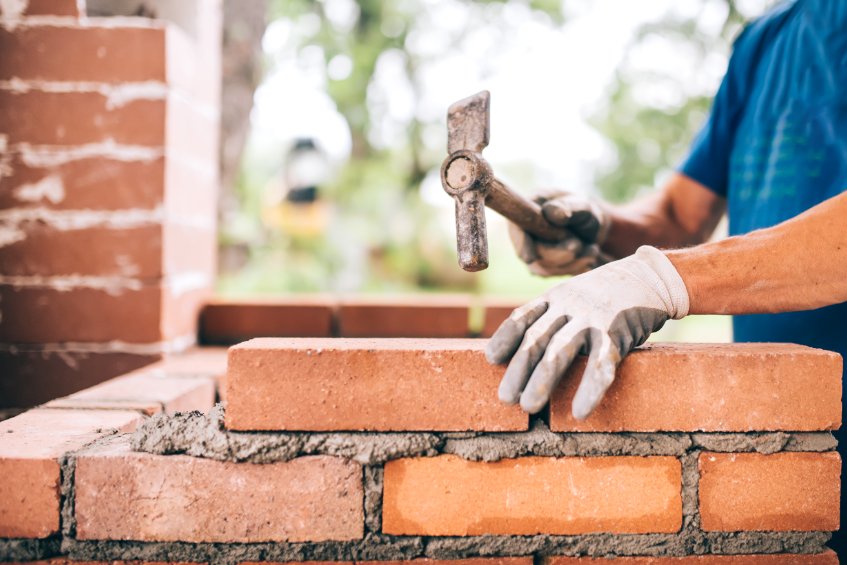Masonry work is a type of construction that involves the use of bricks, stones, and other similar materials. There are many different types of masonry work, each with its own unique set of benefits and drawbacks. This article looks at some of the most commonly used types of masonry work. It will also discuss the pros and cons of each method so that you can decide which one is right for your project.
- Brick Masonry
Brick masonry is one of the most common types of masonry work. Bricks are typically made from clay or shale and are fired in a kiln to harden them. This type of masonry is strong and durable, making it ideal for use in load-bearing structures such as walls and foundations. In addition, brick masonry is relatively easy to repair if it becomes damaged.
Advantages of Brick Masonry

Brick masonry is a popular choice for both commercial and residential construction projects due to its many advantages. Bricks are strong and durable, meaning that they will stand up to the elements and foot traffic for many years. They are also low maintenance, as they do not require painting or staining. In addition, bricks can help to regulate indoor temperatures, keeping homes and businesses cool in the summer and warm in the winter. Since bricks are made from natural materials, they are environmentally friendly.
Disadvantages of Brick Masonry
While brick masonry has several advantages, there are also a few disadvantages to consider. One drawback is that bricks are susceptible to damage from freeze-thaw cycles. When water seeps into the bricks and then freezes, it can cause the bricks to crack or break. In addition, brick walls require regular maintenance, such as repointing or sealing, to prevent moisture damage. Another downside of brick masonry is that it can be very expensive. Bricks are typically more expensive than other building materials, such as wood or concrete. As a result, building a brick wall can significantly increase the overall cost of a construction project.
- Stone Masonry
Stone masonry is another popular type of masonry work. Stones are often used for decorative purposes, but they can also be used to build durable structures. Like bricks, stones are strong and durable, making them ideal for load-bearing applications. In addition, stone masonry is resistant to fire and pests, making it an ideal choice for use in areas that are susceptible to these hazards.
Advantages of Stone Masonry
When it comes to choosing building materials, stone masonry is often an excellent choice. For one thing, stone is extremely strong and durable, able to withstand a great deal of wear and tear. In addition, stone is naturally fire resistant, making it an ideal choice for buildings in fire-prone areas. Since stone is a natural insulator, it can help to keep a building warm in winter and cool in summer. Finally, stone masonry is an attractive option that can add aesthetic appeal to any structure.
Disadvantages of Stone Masonry
One of the biggest drawbacks is the cost. Stone is a costly material, and the labor required to lay it is expensive. In addition, stone masonry can be difficult to repair if it is damaged. Because each stone must be separately cut and fit, it can be time-consuming and expensive to make even minor repairs. Finally, stone masonry can be susceptible to weather damage. Strong winds can cause stones to become loose, and heavy rains can erode mortar joints.
- Concrete Block Masonry
Concrete block masonry is a newer type of masonry work that uses concrete blocks instead of bricks or stones. Concrete blocks are much lighter than bricks or stones, making them easier to work with. In addition, concrete blocks offer superior insulation properties, making them an ideal choice for use in energy-efficient homes. However, concrete block masonry is not as durable as brick or stone masonry, so it is not typically used in load-bearing applications.
Advantages of Concrete Block Masonry
It is extremely strong and durable, making it ideal for load-bearing walls and other structures that need to support a lot of weight. Concrete blocks are also fireproof, so they can help to protect a building in the event of a fire. In addition, concrete blocks are easy to work with and relatively inexpensive, making them a good choice for homebuilders and commercial contractors alike.
Disadvantages of Concrete Block Masonry
One downside is that it can be difficult to make repairs if the blocks become damaged. Additionally, concrete block masonry is a more expensive building material than wood frame construction.
Masonry work is an essential part of many construction projects. There are different types of masonry work that can be used to achieve different results. Masonry work can involve the use of brick, stone, or other materials to create a solid foundation for a building or structure. The type of masonry work that is used will depend on the project and the desired outcome. This job should be done by a professional in order to ensure that it is done correctly and safely.
